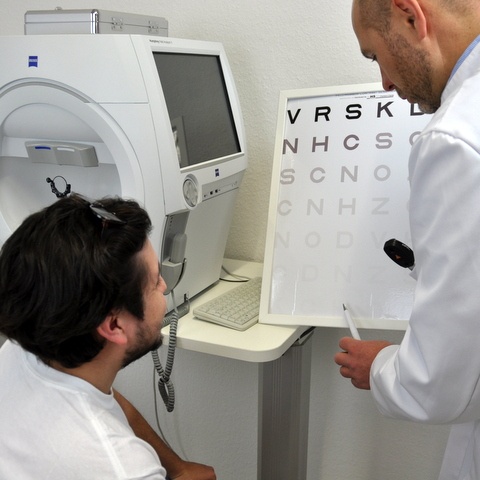One challenge of having a loved one with retinitis pigmentosa is trying to understand what they are going through and what their vision is really like. Knowing that RP is progressive, people with RP also want to better understand what the future will be like as vision loss progresses. While nobody except those with RP will fully understand what life with RP is like, this section aims to breakdown life and vision for someone afflicted with this retinal dystrophy.
Childhood
As a child, the feeling of being different from everyone else is often terrifying and uncomfortable. Many children may notice vision disturbance, but never mention it. Even when diagnosed, these kids may choose to not talk about their vision with anyone and may socially withdraw from friends and family due to insecurity. Childhood social withdrawal may occur more frequently in areas of low light or visually demanding tasks (such as sports).
These children need both constant encouragement and a feeling of safety to discuss their vision with loved ones. Although RP is a visual condition, it can easily become a social and psychological condition as well. RP patients need a support system and understanding. Family members will need to adapt and provide constant psychological support and emotional reassurance in addition to helping their loved one physically navigate through life’s challenges.
Personal
Although each family situation is different and dynamic, sometimes parents feel a strong sense of guilt for passing on the genes which causes this inherited retinal dystrophy. A sense of guilt along with an overwhelming desire to help their child may produce excessive and superfluous acts of service. This excess assistance and constant attention may actually backfire and cause the child to feel overwhelmed which only further highlights his or her vision problems.
 Like everyone else, RP patients eventually need to become independent and comfortable with themselves. Sometimes letting the child be a normal kid is the best thing you can do. Provide all the support when needed, but try not to overcompensate and draw attention to the retinitis pigmentosa. Spouses of those with RP need to have open, truthful, and direct communication and also make sure the spouse with RP never feels like he or she is being a burden. The spouse should understand the disease process and similarly assist the person with RP whenever needed, but without drawing unnecessary attention to the disorder. If the question of having children arises, genetic counseling is strongly advised to fully understand the risks, benefits, and likelihood of having a child with RP.
Like everyone else, RP patients eventually need to become independent and comfortable with themselves. Sometimes letting the child be a normal kid is the best thing you can do. Provide all the support when needed, but try not to overcompensate and draw attention to the retinitis pigmentosa. Spouses of those with RP need to have open, truthful, and direct communication and also make sure the spouse with RP never feels like he or she is being a burden. The spouse should understand the disease process and similarly assist the person with RP whenever needed, but without drawing unnecessary attention to the disorder. If the question of having children arises, genetic counseling is strongly advised to fully understand the risks, benefits, and likelihood of having a child with RP.
Medical Professionals
The mannerisms of medical professionals toward persons with RP varies greatly, probably because the mannerism and desires of RP patients varies greatly. Some medical professionals will only state basic facts about RP and briefly mention how it affects vision and life. Other medical professionals will be entirely too technical and detailed to the point of only stressing out the patient and family members.
 The most important thing is to find medical professionals that you are comfortable with and who give you the information you need in an easy to understand format. Many medical professionals actually appreciate you describing what your life and vision is like as it helps them better serve other RP patients. Medical professionals should empower you with education and support and likewise you can empower them by sharing your insights and stories.
The most important thing is to find medical professionals that you are comfortable with and who give you the information you need in an easy to understand format. Many medical professionals actually appreciate you describing what your life and vision is like as it helps them better serve other RP patients. Medical professionals should empower you with education and support and likewise you can empower them by sharing your insights and stories.
Academic
No matter what form of school you are in − grade school, university, or trade school − RP presents challenges. Vision may be reduced in dim-lit rooms, the board may be difficult to see, contrast sensitivity may make objects less distinguishable, and reading may be difficult (depending on the disease course). Discussing visual difficulties with the teacher or professional is highly recommended so proper and necessary adaptations can be made to put the student in the best position to learn and succeed.
 Sometimes this means having the lights slightly brighter, sitting closer to the front of the room, or allowing low vision devices to be used. Oftentimes simply informing the teacher or professor of the symptoms associated with RP is helpful so the instructor may determine how to best help the student. Depending on the age and opinion of the individual, it may be helpful for the instructor to inform the classmates that the individual has RP. This is situation and person dependent. However, in every situation, an RP patient should be given the fair adaptations and opportunities needed to succeed in the classroom.
Sometimes this means having the lights slightly brighter, sitting closer to the front of the room, or allowing low vision devices to be used. Oftentimes simply informing the teacher or professor of the symptoms associated with RP is helpful so the instructor may determine how to best help the student. Depending on the age and opinion of the individual, it may be helpful for the instructor to inform the classmates that the individual has RP. This is situation and person dependent. However, in every situation, an RP patient should be given the fair adaptations and opportunities needed to succeed in the classroom.
Career
One major problem with retinitis pigmentosa is that the rate and extent of progression is highly variable. Therefore, the degree to which vision loss may affect careers is uncertain. Genetic testing is always advisable and may be useful in roughly estimating the extent of vision loss, however this is still only a prediction. Career choices should be made with the assumption of poor overall vision and absent peripheral vision. Certain jobs such as pilots, police officers, truck drivers, and surgeons will be unattainable.
 Luckily, modern society has such a wide range of jobs available that even when vision is limited people can still have an established and successful career. Technology can also optimize residual vision allowing for many career possibilities. Self-employed, government, and corporate jobs may all be feasible so long as they do not require exceptional vision. Self-employed or work-from-home jobs, if possible, are great options for those with RP. People with RP must be forward thinking, anticipate future vision loss, and adapt their career appropriately.
Luckily, modern society has such a wide range of jobs available that even when vision is limited people can still have an established and successful career. Technology can also optimize residual vision allowing for many career possibilities. Self-employed, government, and corporate jobs may all be feasible so long as they do not require exceptional vision. Self-employed or work-from-home jobs, if possible, are great options for those with RP. People with RP must be forward thinking, anticipate future vision loss, and adapt their career appropriately.
Sports
Ability to play certain sports can be exceptionally challenging for RP patients. Many sports require a high level of visual acuity, peripheral vision awareness, eye tracking, binocularity, and spatial awareness skills. Any sports requiring excellent hand/eye coordination or fast moving objects may prove difficult. However, these sports may still be played, just not at a competitive or professional level.
![]() Some RP patients also partake in recreational sports such as downhill skiing, scuba diving, and mountain climbing. In some occasions it may be necessary to inform teammates or opponents of the visual condition for the safety of everyone. Know that many sports are feasible despite having RP. Just use your best judgement and your support system to help along the way.
Some RP patients also partake in recreational sports such as downhill skiing, scuba diving, and mountain climbing. In some occasions it may be necessary to inform teammates or opponents of the visual condition for the safety of everyone. Know that many sports are feasible despite having RP. Just use your best judgement and your support system to help along the way.
Transportation
Another significant challenge for RP patients is everyday travel. While RP patients may live relatively independent lives, they are likely to depend on family members, friends, or public transit for regular transportation. Unless they work at home, everyday travel requires significant planning. In cases of no family support, friend assistance, or public transportation sometimes RP patients are forced to use Uber, Lyft, or taxis which can be costly. Public transportation use is also sometimes accompanied by anxiety from not seeing road signs of train stops well.
 As you can imagine, vacation travel is also extremely complicated. The typical field of vision for someone with RP is very small. This may lead to them bumping into persons unintendedly or taking longer to navigate public places. To strangers, an RP patient looks completely normal and therefore they assume the person with RP has normal vision. Strangers not understanding their visual condition may become frustrated and make comments or gestures toward them. For these reasons, living in walkable neighborhoods is desirable. If possible, it is best to live near work, school, grocery stores, and restaurants to avoid the burden of frequent transportation. Having family and friend support is also exceedingly helpful.
As you can imagine, vacation travel is also extremely complicated. The typical field of vision for someone with RP is very small. This may lead to them bumping into persons unintendedly or taking longer to navigate public places. To strangers, an RP patient looks completely normal and therefore they assume the person with RP has normal vision. Strangers not understanding their visual condition may become frustrated and make comments or gestures toward them. For these reasons, living in walkable neighborhoods is desirable. If possible, it is best to live near work, school, grocery stores, and restaurants to avoid the burden of frequent transportation. Having family and friend support is also exceedingly helpful.
Social
Social circumstances, difficulties, and normalities are fluid by age for all persons. As a child, being different is terrifying. As an adult, being different may be desirable. Social elements are no different for patients with RP, but they may need to be navigated differently. Perhaps the biggest area of navigation is when meeting new people. Since RP is a large factor in their lives, the condition and effects of RP are important for friends to understand. RP patients will likely not feel understood or close to friends until their friends know about this retinal condition and understand how it affects their life. Like most people, RP patients are unlikely to be overly vulnerable the first time they meet someone. It may take a little longer for RP patients to become close friends with people. Conversely, RP patients may also simply decide to be more vulnerable with people and discuss their visual status early on in a new friendship.
 This depends entirely on the personality they have and what choices they wish to make. As children and adolescents, RP patients may wait to share about their vision as long as possible. As an adult, RP patients may be more open and communicative about their vision as their self-confidence grows. Generally social health improves with age in RP patients and sharing about their visual difficulties becomes easier with time. Earlier and direct communication in adulthood about RP helps friendships develop quicker and is socially beneficial. The social health of people with RP is usually related to their quality of friends and how well those friends understand their retinitis pigmentosa.
This depends entirely on the personality they have and what choices they wish to make. As children and adolescents, RP patients may wait to share about their vision as long as possible. As an adult, RP patients may be more open and communicative about their vision as their self-confidence grows. Generally social health improves with age in RP patients and sharing about their visual difficulties becomes easier with time. Earlier and direct communication in adulthood about RP helps friendships develop quicker and is socially beneficial. The social health of people with RP is usually related to their quality of friends and how well those friends understand their retinitis pigmentosa.
Blog prepared in cooperation with Kaleb Abbott, O.D., M.S.
REFERENCES:
Williams, David. (2007). Retinal Degeneration in Usher Syndrome. 10.1007/978-1-59745-186-4_7.
Retinal degenerations : biology, diagnostics, and therapeutics / edited by Joyce Tombran-Tink and Colin J. Barnstable. p. (Ophthalmology research) ISBN 1-58829-620-2 (2007)





3 Comments
Click here to read/write comments